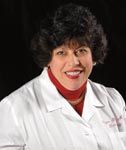- General Dermatology
- Eczema
- Chronic Hand Eczema
- Alopecia
- Aesthetics
- Vitiligo
- COVID-19
- Actinic Keratosis
- Precision Medicine and Biologics
- Rare Disease
- Wound Care
- Rosacea
- Psoriasis
- Psoriatic Arthritis
- Atopic Dermatitis
- Melasma
- NP and PA
- Skin Cancer
- Hidradenitis Suppurativa
- Drug Watch
- Pigmentary Disorders
- Acne
- Pediatric Dermatology
- Practice Management
- Prurigo Nodularis
Article
Physician's profile: Erasing the past: Derm reaches out to tattooed gang members, other at-risk youth
"The past drives Bryna Kane, M.D., to make a difference for the future. "
The past drives Bryna Kane, M.D., to make a difference for the future.


Dr. Kane, dermatologist and assistant clinical professor of dermatology at the University of California, Davis, Calif., was set on a career in medicine by age 9.
She would hear tales of her grandmother, Bryna, who was one of the first female physicians to graduate from a medical school in Poland. Bryna was not only a pioneer in medicine, but also a courageous woman who risked her own life to save others.
According to Dr. Kane, the Nazis kept Bryna alive to care for the SS officers and their wives, but later killed her when they found she had harbored neighborhood children to protect them from an almost certain death.
"I look exactly like her, and I have always loved helping people," Dr. Kane says.
Dermatology seemed to be the perfect direction, according to Dr. Kane, who says about 20 percent of her practice today is in pediatric dermatology.
"The specialty is very esoteric, and it encompasses so many different areas - pediatric, adult, you get to do surgery and in-detail diagnostic testing. It is also very visual and very gratifying," Dr. Kane tells Dermatology Times.
Branded by the past
Early on, Dr. Kane saw the negative effect that tattoos could have on people's lives. While her parents, who are Holocaust survivors, emerged from the Auschwitz concentration camp without the identifying numbers, their friends were not so lucky.
"My father would hide under piles of dead bodies because he did not want to get tattooed. A lot of those people who got tattooed got hepatitis and other related diseases," she says.
Dr. Kane says the many family friends who were branded at Auschwitz did not want the tattoos removed. Those tattoos, she says, serve as a reminder of the atrocity - and of surviving it.
Tattoos branding teens with violent messages and symbols have a very different outcome. These, she says, keep the kids who wear them from moving forward in life.
"You cannot even get a job at a local ice cream shop if you have ... 'vida loca' tattooed on your hand," she says.
Dr. Kane thought she could help, and in 1998, she and her practice partner, Edward Glassberg, M.D., a Mohs and laser surgeon, launched Erase the Past, a program that provides at-risk teens and young adults with free tattoo removal in exchange for community service.
Qualified applicants
Youth who benefit have to be open to change and ready to get on with more moral, responsible lives, Dr. Kane says.
Qualified applicants for the program are, in general, ages 14 to 28, are not currently involved in a gang and are in school or are working.





